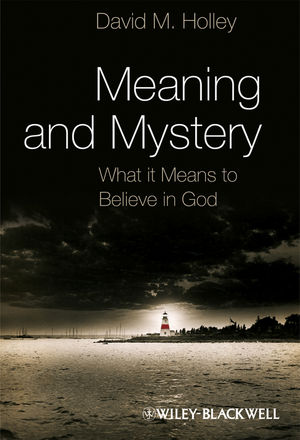Meaning and Mystery: What It Means To Believe in GodISBN: 978-1-4051-9344-3
Paperback
256 pages
January 2010, Wiley-Blackwell
 Other Available Formats: Hardcover
|
||||||
Connect with Wiley Publicity
David Holley offers a fresh interpretation of the impetus behind spirituality and personal faith in MEANING AND MYSTERY: What It Means to Believe in God (February 2010 (U.S.); January 2010 (UK)). He challenges the widespread assumption that we should treat God’s existence as a theoretical hypothesis that can be considered at arm’s length. Such an approach, he claims, distorts the issue and shields us from the intensely personal considerations involved either in accepting or rejecting this kind of belief.
The book’s preface describes an encounter with a student who was trying to decide whether to continue believing in God. To Holley’s chagrin, the student thought about the matter with an attitude of detachment, as if he were dealing with an intellectual puzzle, oblivious to how altering his belief would mean a fundamental upheaval in his thought and life. Holley characterizes the shift being contemplated as “less like deciding you were mistaken about whether you kissed your spouse goodbye this morning and more like deciding you were mistaken in thinking you had a spouse.”
Holley urges us to view the question of belief in the context of deciding about a life-orienting narrative. Coming to believe or to disbelieve, he claims, is not a matter of judging the truth of an isolated proposition, but arriving at a background story that is comprehensive enough to shape an understanding of how to live.
Neither theism nor atheism, claims Holley, becomes convincing apart from the larger narratives in which the experiential meaning of either position is fleshed out. We do not decide about God and then decide whether to accept a particular narrative; we come to accept or to reject the idea of God through finding some narrative viable as a guide to life. Embracing either a narrative of belief or a narrative of unbelief involves a level of personal engagement that is missing from standard ways of discussing the existence of God.
In moving the question of God’s existence to the practical context of seeking a narrative to live by, Holley endorses a broader and less detached kind of reflection than typical arguments for and against God’s existence permit. To be viable a life-orienting narrative must do more than fit with the facts; it needs to illuminate our awareness of what is valuable and connect with our aspirations to live a worthy life. This kind of narrative cannot become our own without appealing to us at a motivational level.
Without trying to settle the question of belief, Holley provides a guide for the person who wants to think seriously about God. Steering a course between unbelievers who cannot regard belief as an option worth considering and believers who cannot entertain the possibility of being mistaken, this book presents the issue in a way that makes central our receptivity or lack of receptivity to narratives with or without God that might structure a way of life.
Also included:
- A window into some of the great literary minds: Leo Tolstoy’s A Confession, Edwin Abott’s Flatland, Yann Martel’s Life of Pi and Victor Hugo’s Les Misérables
- References to popular culture, advertisements, and television including the series Joan of Arcadia and the film Stranger Than Fiction
- Observations from sociology, linguistic theory, behavioral, and cognitive psychology to illuminate the nature of religious beliefs, and how removing religious questions from their larger practical context distorts our thinking about them
Written in a style that is accessible to readers with little background knowledge of philosophy, as well as philosophers who want to approach the question of God’s existence in a new way, Holley provides a path to deciding about the fundamental convictions that will shape us.



